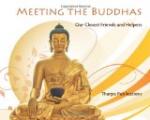Toads eat the common house-fly, which is such an annoyance to us. A toad has been seen to snap up eighty-six flies in less than ten minutes.
Toads are sometimes kept for pets, and they are not lacking in intelligence. Once a toad lived in a garden, and every day at the dinner hour he came to be fed. It happened that the dinner hour was changed, and when the toad came there was nothing for him to eat. Mr. Toad made up his mind that he would not lose his dinner twice. On the second day he came at the new hour, and after this he was as punctual as the rest of the family. No one could tell how he knew that in the future his dinner would be served two hours earlier.
The toad is often the victim of thoughtless cruelty. He can do no one any harm. He cannot even run away when he is stoned and tormented. The fun of teasing him must be like that of beating a baby or a helpless cripple. No one but a coward could ever think it an amusing thing to do.
Perhaps no animal is so misunderstood as the bat. He seems such a queer compound of mouse and bird, and to most of us he is such a stranger, that we do not have a very friendly feeling for him.
Of course you know that he is not a bird at all. Birds have feathers and the bat has soft, smooth fur. He is absolutely harmless, unless frightened or hurt, and he is a very useful little fellow. He eats mosquitoes and house-flies and the insects that cause most of the worm-eaten apples.
Bats fly only at night. They soon become friendly with any one who is kind to them, and will come to be fed or stroked. One who has studied them says that the good they do is very great and that the value of one of the little animals might easily amount to fifty dollars a year.
Are we not unjust to any living creature when we shrink from it because to us it does not seem beautiful? It may well be that our eyes are too dull to see its real beauty. But whether we can see the beauty or not, it is only fair that we should recognize the service which we are so willing to accept.
A TRIUMPH.
Little Roger up the long slope rushing
Through the rustling corn,
Showers of dew-drops from the broad leaves brushing,
In the early morn,
At his sturdy little shoulder bearing,
For a banner gay,
Stem of fir with one long shaving flaring
In the wind away!
Up he goes, the summer sunrise flushing
O’er him in his race,
Sweeter dawn of rosy childhood blushing
On his radiant face;
If he can but set his standard glorious
On the hill-top low,
Ere the sun climbs the clear sky victorious,
All the world aglow!
So he presses on with childish ardor,
Almost at the top!
Hasten, Roger! Does the way grow harder?
Wherefore do you stop?
From below the corn-stalks tall and slender
Comes a plaintive cry;
Turns he for an instant from the splendor
Of the crimson sky,




